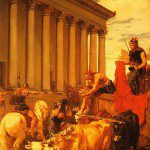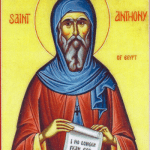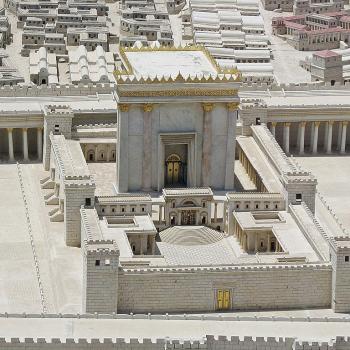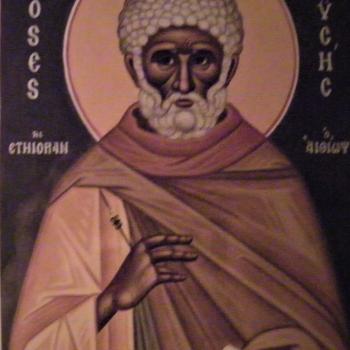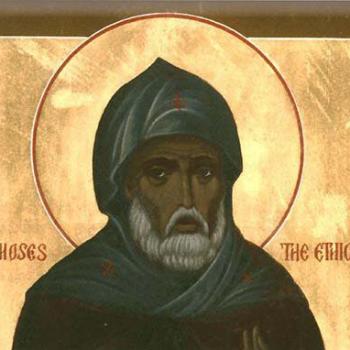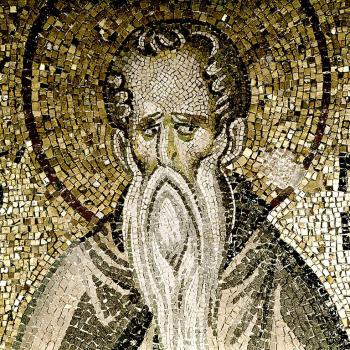The Great Fast, Lent, is a time of spiritual reflection. The forty days not only reflect Jesus’s journey into the desert, upon which he fasted for forty days and faced severe temptations before the start of his public ministry, but also the years which Moses and the children of Israel were said to wander between Egypt and the Promised Land. It is a time of struggle, a time of purification, and hopefully a time of spiritual enlightenment.
By how it is typically presented, when people contemplate Lent, they first think about fasting, about fasting regulations or what one has to give up, and in the process, they think Lent is about what one gives up for a limited time, without truly understanding the purpose of their actions.
![Holy Week Procession in Granada by By Chopanito (Own work) [GFDL (http://www.gnu.org/copyleft/fdl.html) or CC BY 3.0 (http://creativecommons.org/licenses/by/3.0)], via Wikimedia Commons](https://wp-media.patheos.com/blogs/sites/637/2017/02/Holy_Week_procession_in_Granada_Nicaragua-300x225.jpg)
The Great Fast, Lent, therefore is a time in which we are to learn self-control. This is not to say we have not learned it before, but, year after year, it is likely that there is more for us to learn, more depth within for us to explore, more examination to see where our weaknesses lie, and so more awareness of what we can do in order to improve our spiritual condition.
The point then is that we are to gain self-awareness. We must come to know ourselves. The Fast is not about what we give up, but what we gain: self-knowledge. Once we have come to know ourselves, we can come to know God, for in knowing ourselves, we will come to know our true relationship with God. The process certainly includes emptying ourselves of all distractions, all entanglements which would lead us astray. Fasting is a way to do this, but it is not the only way, and indeed, though the period is known as the Great Fast, fasting is only a means, and not the primary one, by which we empty ourselves from all that is false and come to know who and what we are once all the illusion we have held to is shed from us.
We are selfish. We are self-seeking. We are ignorant. We are easily led astray by our own inordinate desires. We seek after our own immediate good over the long term good, let alone the common good. The Great Fast reminds us that this way of life, this way of thinking, leads us away from the happiness which we desire. We might gain a little pleasure, but the long term effects is detrimental to ourselves and those who we love (let alone those we are called to love but do not). To know ourselves is to know our weaknesses, to know what we have made of ourselves. It is to see through all the pretense and illusion of the self we have created for ourselves to hide who we are from ourselves and for all who come to meet us. Then we can look at ourselves, our true selves, knowing who we are in God, unobscured by the defilement of sin, unattached to the illusion, undetermined by our ego. We will then see and who we are, made in the image and likeness of the God who is love. To know ourselves is to know love, to be self-giving, every rejecting all attachment to ourselves through self-denial, but not in a nihilistic self-denial which seek the destruction of what is good within us, but the self-denial which cuts through all the spiritual delusion and waste from sin and sets us free to live and breathe in the spirit of love.
It is not easy to truly be open and empty of all that defiles us so that we can come to know ourselves. Indeed, it is extremely difficult. Most of us, myself included, are sinners who have so many bad habits that control us, that we find ourselves wandering around like the children of Israel, going around in circles but never entering the Promised Land. The Great Fast rightfully reminds us of the children of Israel, and puts us in solidarity with them, as we realize that what is said of them is actually a reflection of us as we live our day to day lives. We keep grumbling as God guides us out of the land of Egypt (that is, out of sin) and to the Promised Land, even though he gives us bountiful gifts (such as the sacraments). We fail to appreciate what God is doing for us because we want to dictate to God how he should serve us instead of listening to him and let him direct us to our perfection. We, too, try to make rocks produce water, as we stumble through the spiritual land, parched because of our sin. And so we only receive a small portion of the living water which Christ has in store for us in the Promised Land.
During the Great Fast, let us not think about what we are giving up. Let us think about what we are willing to receive. Let us think of the graces which are being offered to us, and accept them for what they are, tokens of God’s guiding love. Let us grow in faith, hope and love as we empty ourselves from those attachments which seek to stifle our faith, undermine our hope, and cast aside our love. For our faith, let us look to some spiritual resource and pick it up, and gain from the wisdom within (this year, I am re-reading Augustine’s City of God for this purpose). Let us, moreover, overturn the despair which is in our lives, all those weeds seeking to undermine our hope by following the path of mercy which sees the goodness in all so that there is hope for all. Finally, let that goodness then draw us in so we can grow to love all things as we follow after the example Christ our Lord and Savior.
The Great Fast is not about fasting, though fasting is certainly a tool used in it for our own good. The Great Fast is about spiritual reawakening. Let us hope this year God truly moves us with the fire of love, so that in the end, it is will not be about what we have given up, but what we have gained.
Stay in touch! Like A Little Bit of Nothing on Facebook:
A Little Bit of Nothing


